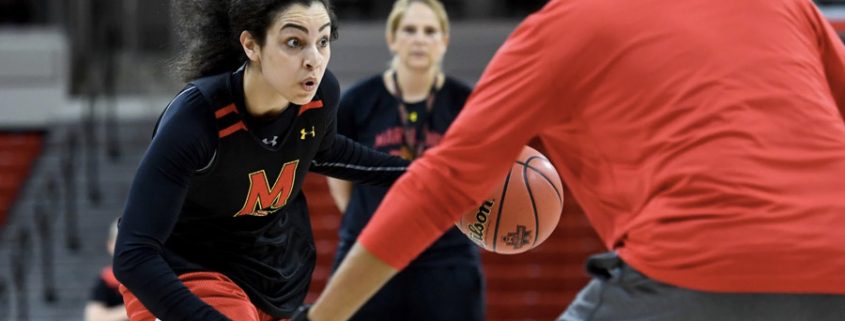RALEIGH, N.C. — When Eleanna Christinaki quit the Florida women’s basketball team midway through her sophomore season, the Greek national was flooded with offers to play professional basketball back home in Europe. She had the pedigree; Christinaki was the second-youngest player to ever play for Greece’s national team, and she was the Gators’ leading scorer when she decided to leave, averaging 17.6 points per game.
She had the chance to make a considerable amount of money and be closer to her parents and younger brother, who live in Cyprus. But Christinaki declined every offer, because none of the teams calling and texting had what Maryland was offering: The chance to earn a college degree and a basketball coach Christinaki trusted would develop her as a player and a person.
“I stayed here in the U.S. because I really believe in our coach and our team,” Christinaki said Saturday, sitting outside of the team’s locker room at North Carolina State’s Reynolds Coliseum. “I wouldn’t have stayed if it wasn’t Maryland.”
Christinaki, Maryland’s third-leading scorer, came to College Park to get an education and to play for Coach Brenda Frese. She has become a vital player for the No. 5 seed Terrapins, especially as matchups get tougher deeper into the NCAA tournament bracket. When the Terps (26-7) face No. 4 seed North Carolina State (25-8) on Sunday on the Wolfpack’s home court, they will rely on her scoring ability to support leading scorer Kaila Charles and her ability to make plays on offense.
Christinaki is technically Maryland’s second-leading scorer, averaging 12.1 points, as Blair Watson (13.8) hasn’t played since January because of an injury. When she is shooting well, as she did Friday when she turned in 16 points including two three-pointers in a blowout first-round win over Princeton, Christinaki fills the crucial sidekick role for Charles (18.4), a spot Maryland hasn’t quite been able to fill consistently since Watson tore her anterior cruciate ligament.
The 6-foot wing has a knack for big games — in her Maryland debut in December against Coppin State, she went off for a season-high 32 points. In January, she helped the Terps net their first win over Ohio State since the 2014-15 season with 26 points including six three-pointers. On Friday against Princeton, she set an intense tone for Maryland with her signature flashy, no-look passes and eight rebounds.
“When she’s in the zone, she’s in the zone,” said assistant coach Bett Shelby, who was Christinaki’s main recruiter to Maryland. “When she’s locked in she’s really hard to stop, and that’s where her toughness comes in.
“With our style of play especially — we defend, we rebound, and we run, and the way she can run and put pressure on the defense to guard and to stop her, it opens things up for other people on the floor. She’s brought that three-dimensional element to us. Losing Blair, she gives us another player on the perimeter with offensive power. That’s what we need.”
Maryland’s coaches believe Christinaki, who is Frese’s first midseason transfer to College Park, is just starting to reach her full potential. She has been a streaky shooter and struggled late in the conference season in particular, but her 16 points against Princeton were the most she has had in a game since an 18-point performance against Rutgers on Feb. 11.
Christinaki admits she has had a hard year. Last year was agony for the fiery competitor, having to sit out most of the season while she continued to adjust to what was still a relatively new culture for her in the U.S. She found it almost as challenging this year to insert herself into a roster that had played an entire preseason and had already found its rhythm.
Frese and Shelby knew they had to be conscious of Christinaki’s adjustment period. Frese said she made a mental note to give Christinaki at least 11 games, which is how long the coach estimated that it took everyone else on the team to get accustomed to playing together.
Christinaki’s teammates were accommodating as well. The biggest hurdle to Christinaki’s success was the language barrier. She didn’t start learning English until high school and spoke almost none when she arrived on Florida’s campus. When Christinaki is tired in games, it gets harder for her to translate what her teammates are yelling.
The team has a system now during timeouts in games — Frese addresses the team, then Charles repeats the message to Christinaki again, and Kristen Confroy repeats it a third time just in case.
“We do that, then, okay! We’re good,” Christinaki said. “Teamwork makes the dream work.”



